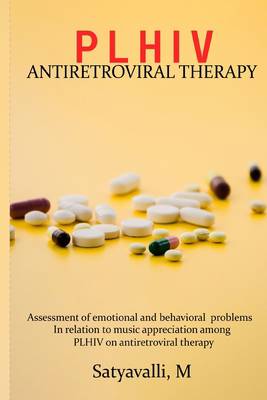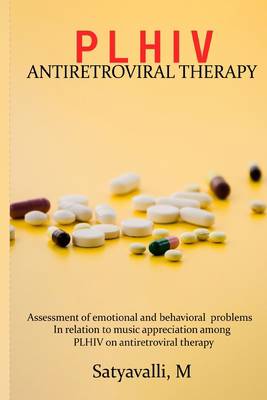
- Retrait gratuit dans votre magasin Club
- 7.000.000 titres dans notre catalogue
- Payer en toute sécurité
- Toujours un magasin près de chez vous
- Retrait gratuit dans votre magasin Club
- 7.000.0000 titres dans notre catalogue
- Payer en toute sécurité
- Toujours un magasin près de chez vous
Assessment of emotional and behavioral problems in relation to music appreciation among PLHIV on antiretroviral therapy
Satyavalli MDescription
ABSTRACT The co-occurrence of HIV and mental illness poses a significant public health problem and represents a difficult challenge for those who treat and care for these persons. Emotional and mental health are important issues for people with HIV. The present study aimed to assess wellbeing, emotional and behavioral problems in relation to their appreciation of music among PLHIV on Antiretroviral therapy. A descriptive survey design was used to identify wellbeing, emotional behavioral problems and appreciation of music among PLHIV and to find association between them. Prior to the study, the researcher obtained permission from National AIDS Control Organisation, New Delhi and Andhra Pradesh state AIDS control Organisation, Hyderabad to conduct a study on PLHIV in United Andhra Pradesh. The investigator also obtained the ethical approval from Institutional Ethics Committee, King George Hospital, Visakhapatnam. The sample for the present study was 287 people living with HIV on antiretroviral therapy attending ART centres at King George hospital, Visakhapatnam and Osmania General Hospital, Hyderabad in United Andhra Pradesh. A Formal permission was obtained from Medical Superintendents of both the hospitals to conduct the study on PLHIV attending ART centres. The sample was selected from both the ART centres by using purposive sampling technique. The study included adults of both male and female whose age falls between 18-59 years of people living with HIV undergoing Anti retroviral therapy. The data were collected with the help of Achenbach adult self report form to identify emotional and behavioral problems. The ASR consists of 126 item checklist that include eight empirically based syndrome scales anxious/depressed, withdrawn, somatic complaints, thought problems, attention problems, aggressive behaviour, rule breaking behaviour and intrusive behaviour. WHO (Bradley) Wellbeing scale was used to assess wellbeing consisting of 22 items, which is a multidimensional measure that assesses depression, anxiety, energy and positive wellbeing and also total wellbeing. The investigator also assessed the participants for their appreciation of music through structured music appreciation questionnaire consisting of 22 items that measures both music interest and music
Spécifications
Parties prenantes
- Auteur(s) :
- Editeur:
Contenu
- Nombre de pages :
- 142
- Langue:
- Anglais
Caractéristiques
- EAN:
- 9781805452294
- Date de parution :
- 14-11-22
- Format:
- Livre broché
- Format numérique:
- Trade paperback (VS)
- Dimensions :
- 152 mm x 229 mm
- Poids :
- 199 g







